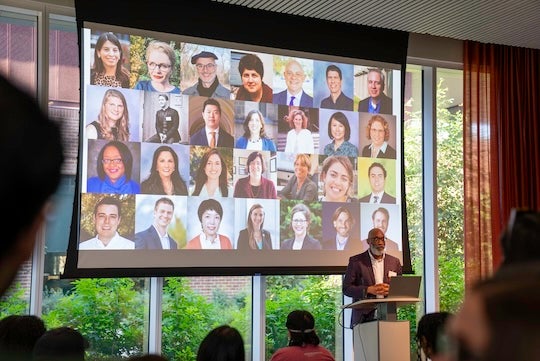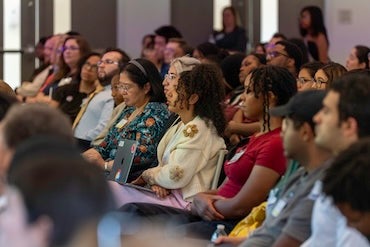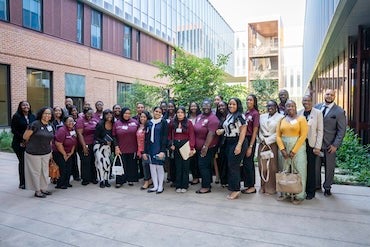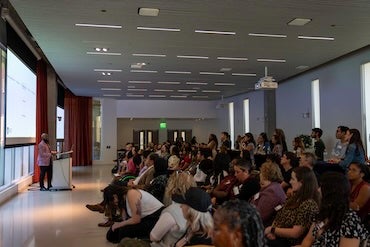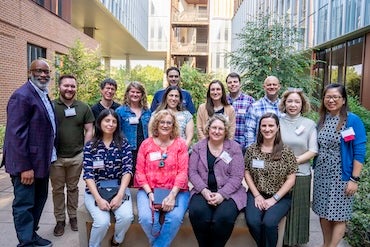The Statistical Training and Research Techniques program at Rice University, known as STaRT@Rice, is recognized for cultivating exceptional researchers and fostering community. It held its annual fall event Oct. 11-14 in Kraft Hall.

Founded by Tony Brown, a distinguished professor of sociology at Rice, this year’s program included workshops taught by almost 30 Rice faculty, postdoctoral fellows and researchers. Jing Chen, an associate professor of psychological sciences, joined Brown this year as the program’s co-director.
“I’m incredibly thankful to Professors Brown and Chen along with the dedicated faculty and staff who eagerly joined forces to support this program,” said Dean of Social Sciences Rachel Kimbro. “It provides tremendous value to emerging researchers in our field, and I hope to see it grow even more in the years ahead.”
The program was created in 2021 with two goals in mind: enhance the sense of community within the School of Social Sciences by fostering relationships between underrepresented minorities and first-generation, low-income (FGLI) Rice students, and introduce them to research techniques used in the school’s various departments. That year, 32 Rice graduate students attended.
Since then, the program has expanded far beyond the hedges. In 2022 and 2023, the program welcomed undergraduate and graduate students at Rice and in the greater Houston area; this year, more than 120 student and nonstudent participants from 16 states, the District of Columbia and four countries attended the four-day event.
The event kicked off with remarks from Rice President Reginald DesRoches, Dean of Graduate and Postdoctoral Studies Seiichi Matsuda, Kimbro and Brown.
“Having a solid foundation in research methods for success in the social sciences is extremely important, and this is what our School of Social Sciences truly excels in,” DesRoches said. “So you’re in the right place. I want to encourage you to make the most of your time together, not only in terms of learning new skills but in community building — building a community for success goes an extremely long way.”
Brown said while the program has grown, its primary aims have remained the same.
“We want to grow your professional and social networks,” Brown said. “We want you to connect with each other. We want you to ask each other about your success stories, how you’ve made it as far as you have. Get to know each other, get to know instructors, have conversations over meals, talk with fellow participants from different backgrounds, talk about interdisciplinarity. That’s what this program is about.”
Naksh Patel, an undergraduate at the University of Texas at Austin, said from the very beginning the program made them feel very welcome.
“Hearing so much of the rhetoric today, the storytelling, academic interests, all of that makes me feel like I have a place here,” Patel said. “I feel valuable in this setting. Just listening to a few professors and very educated people who are empathetic and interested in why I’m here, what I’m doing, helping all of us foster a supportive learning environment has been incredible.”
Nathaniel Angelo Uy, a Rice Master of Global Affairs student from the Philippines, attended STaRT@Rice after hearing it was a “once in a lifetime experience.” Immediately, he said he was impressed with the workshops and the networking opportunities made possible by the program.
“I’ve been interacting with professors, and I’m already thinking about further studies, possibly a Ph.D. in political science in the future,” Angelo said.
Shavonte Dean, a senior in the social work program at Texas Southern University, said she gained a lot of insight on how to prepare herself for presentations and seminars.
“Being that we’re (future) social workers, we will deal with a lot of seminars, interacting with clients, dealing with a lot of different situations and different populations,” Dean said. “We were taught how to actually analyze and conduct presentations.”
Dean pointed to some of the details she learned — about the importance of tone in presentations and succinctly summarizing the main points of your work. She said she hopes the lessons will help her more effectively and efficiently complete her degree.
Brown was inspired to create the STaRT@Rice program after his own experience as an underrepresented minority and FGLI graduate student at the University of Michigan, where he was part of the Inter-university Consortium for Political and Social Research summer program that introduced graduate students from diverse backgrounds and disciplines to the academic rigor of the university while providing opportunities to connect and support one another.
“STaRT@Rice has always been a passion project for me. With each passing year, we see the program’s increasing potential to change how we teach methods and coach professionalism, basically how we nurture scholars,” Brown said. “I am thrilled by the program’s unparalleled success and inspired to make it bigger and better next year. I have experienced firsthand the benefit of this type of program in terms of reducing impostor syndrome, and I feel so fortunate that I can now direct something that is similarly beneficial to so many student and nonstudent participants from all walks of life.”
“STaRT@Rice offers opportunities to learn rigorous research techniques and statistical methods in the social sciences as well as the chance to connect with others,” Chen said. “More importantly, many of our attendees wouldn’t have access to these opportunities otherwise. I am incredibly grateful to be part of this effort and to witness the impact we’re making on participants’ lives. I can’t wait to see how this program continues to evolve and the incredible futures it will help shape.”
More information is available online at https://start.rice.edu.

